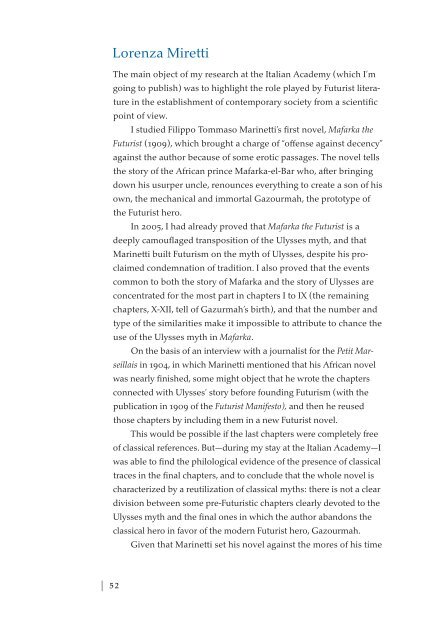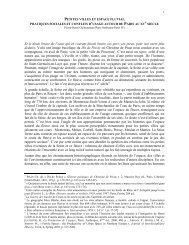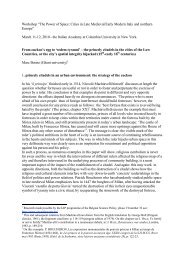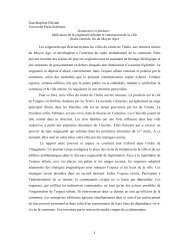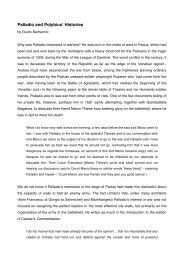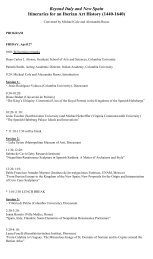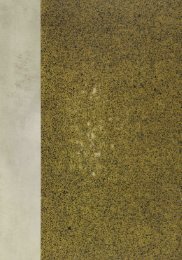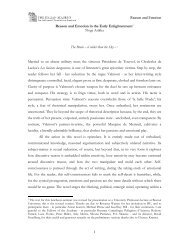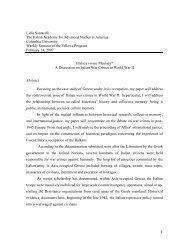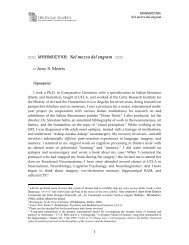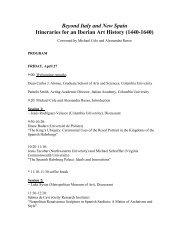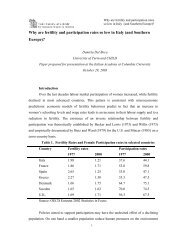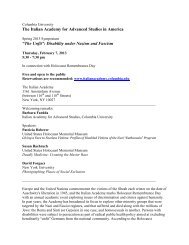2011-2012 - The Italian Academy - Columbia University
2011-2012 - The Italian Academy - Columbia University
2011-2012 - The Italian Academy - Columbia University
You also want an ePaper? Increase the reach of your titles
YUMPU automatically turns print PDFs into web optimized ePapers that Google loves.
Lorenza Miretti<br />
<strong>The</strong> main object of my research at the <strong>Italian</strong> <strong>Academy</strong> (which I’m<br />
going to publish) was to highlight the role played by Futurist literature<br />
in the establishment of contemporary society from a scientific<br />
point of view.<br />
I studied Filippo Tommaso Marinetti’s first novel, Mafarka the<br />
Futurist (1909), which brought a charge of “offense against decency”<br />
against the author because of some erotic passages. <strong>The</strong> novel tells<br />
the story of the African prince Mafarka-el-Bar who, after bringing<br />
down his usurper uncle, renounces everything to create a son of his<br />
own, the mechanical and immortal Gazourmah, the prototype of<br />
the Futurist hero.<br />
In 2005, I had already proved that Mafarka the Futurist is a<br />
deeply camouflaged transposition of the Ulysses myth, and that<br />
Marinetti built Futurism on the myth of Ulysses, despite his proclaimed<br />
condemnation of tradition. I also proved that the events<br />
common to both the story of Mafarka and the story of Ulysses are<br />
concentrated for the most part in chapters I to IX (the remaining<br />
chapters, X-XII, tell of Gazurmah’s birth), and that the number and<br />
type of the similarities make it impossible to attribute to chance the<br />
use of the Ulysses myth in Mafarka.<br />
On the basis of an interview with a journalist for the Petit Marseillais<br />
in 1904, in which Marinetti mentioned that his African novel<br />
was nearly finished, some might object that he wrote the chapters<br />
connected with Ulysses’ story before founding Futurism (with the<br />
publication in 1909 of the Futurist Manifesto), and then he reused<br />
those chapters by including them in a new Futurist novel.<br />
This would be possible if the last chapters were completely free<br />
of classical references. But—during my stay at the <strong>Italian</strong> <strong>Academy</strong>—I<br />
was able to find the philological evidence of the presence of classical<br />
traces in the final chapters, and to conclude that the whole novel is<br />
characterized by a reutilization of classical myths: there is not a clear<br />
division between some pre-Futuristic chapters clearly devoted to the<br />
Ulysses myth and the final ones in which the author abandons the<br />
classical hero in favor of the modern Futurist hero, Gazourmah.<br />
Given that Marinetti set his novel against the mores of his time<br />
| 52


